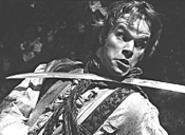Already, Gilliam's spinning like a top over his first film in seven years, bad-mouthing Dimension Films boss Bob Weinstein for interfering with the making of his long-delayed latest, The Brothers Grimm, which is actually not about Bob and his even more infamous sibling Harvey of Miramax. Like a wide receiver with bad hands, Gilliam's already claiming interference before the pass has been thrown. Bob replaced the director's star Samantha Morton with a lesser-known, though perhaps far more marketable pretty face (Lena Headey); Bob kicked off Gilliam's cinematographer Nicola Pecorini, with whom Gilliam made his most recent wild turkey, Fear and Loathing, and his upcoming Tideland; and Bob slashed the budget, apparently from $100 to $50. Like no one could see this coming, this Zippo tossed into an open gas tank; not in a long time has something arrived in theaters so . . . doomed.
At least The Brothers Grimm does not disappoint: It gives off quite a pungent smell -- especially for something so forgettable. Imagine if someone had remade Ghostbusters, but set it in the forest where Hansel and Gretel were kidnapped and Little Red Riding Hood was snatched, then cast Matt Damon as a fairy-tale writer with an English accent and spent the catering budget shooting it. Would that sound at all good to you? Of course not -- an obvious fact that somehow eluded the attention of Gilliam and screenwriter Ehren Kruger, whose other new film, The Skeleton Key, shares the essential text of The Brothers Grimm. (Has something to do with the stealing of souls to guarantee immortality for hoodoo priests and evil queens.)
The whole film, set in Napoleon-controlled Germany during the early 1800s, looks as though a fine sheen of muck covers what appears to be a studio-lot forest, in which tree roots flop around like puppet-show tentacles. It's easily the ugliest film Gilliam's ever made, a movie shot with a lens someone forgot to wipe. It's also his loudest: Every scene is amped up to 11, and every line of dialogue is delivered as though it's a cry for help from the bottom of the well. The movie works hard to entertain, but all you're likely to notice is the flop sweat beading its upper lip.
At this point, is it even worth it to tell you the story? This, then: Cynical Will Grimm (Matt Damon) and his true-believing brother, Jacob (Heath Ledger), travel the cloudy countryside in search of villages in need of exorcising. They pose as demon-busters and, with their two compadres (The Office's Mackenzie Crook and Richard Ridings), stage a capture with a ghostly prop. One day, French governor Delatombe (Brazil's Jonathan Pryce, reminding Gilliam fans of lost, better days) snatches the lads and forces them to do their hoodoo in a village where kiddies are being taken -- as it turns out, by an ancient evil, imprisoned queen (Monica Bellucci), who needs the souls of the young in order to regain her youth and beauty, though apparently not her acting ability.
Gilliam's always been easy to admire, but his movies have grown harder to adore: They're too manic, too desperate, more out-of-control than inventively wild. This one, especially, feels like an amateur's parody of Gilliam himself; you can hear the sound of self-congratulatory giggles in Damon's half-assed accent, Ledger's half-mad moping, and Peter Stormare's Chico Marx bark, as he enacts the bonkers Italian sidekick to Pryce's limp and lisping leader. Even its "Fractured Fairy Tale" setup is old news by now, having been better covered in the likes of Shrek and its superior sequel. This is grim stuff, indeed; oh brother, is it.


